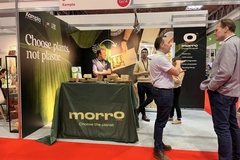Bottles to tires? Michelin and Carbios partner on car tires made from enzymatically-recycled PET
.png)
12 May 2021 --- Bio-industrial company Carbios is partnering with Michelin to produce car tires from waste PET bottles.
The initiative will be the first large-scale operation to employ Carbios’ enzymatic recycling process, which breaks down PET monomers, for the conversion of packaging waste into automobile parts.
Described as a “world first” by the collaboration, the scheme is being touted for its potential to “circularize the gap” between the 1.6 billion car tires and estimated 800,000 tons of PET waste produced each year.
Speaking to PackagingInsights, Carbios’ deputy CEO Martin Stephan says the project is made possible by the company’s unique enzymatic technology.
“Carbios is the first and only company to have developed biological technologies for end-of-life of plastics and textiles. Through this process, we can divert PET waste from incineration and landfills.”

“Revolutionary” recycling process
Carbios’ recycling process, first developed in 2019, uses a PET hydrolase enzyme capable of depolymerizing the PET used in various applications like bottles, trays and polyester clothing.
The technology enables infinite recycling of all types of PET waste. It also allows the production of 100 percent recycled and recyclable PET products with the same quality as virgin PET, says the company.
 The initiative could see up to three billion PET bottles recycled into tires annually.Conventional thermomechanical recycling processes for complex plastics do not achieve the PET high-performance grade required for pneumatic applications like tires.
The initiative could see up to three billion PET bottles recycled into tires annually.Conventional thermomechanical recycling processes for complex plastics do not achieve the PET high-performance grade required for pneumatic applications like tires.
However, the monomers resulting from Carbios’ process, which uses colored and opaque plastic waste like bottles, are repolymerized into PET, making it possible to obtain a high-tenacity fiber meeting Michelin’s tire requirements.
Carbios’ high-tenacity polyester is suitable for tires due to its breakage resistance, toughness, and thermal stability.
“We did not just opt to use PET bottles. We demonstrated the effectiveness of our process,” says Stephan.
“Carbios’ technology is extremely tolerant with raw materials because of the specificity of the enzymes and the process’ low temperature. We can make any kind of PET product using any kind of PET waste.”
Rabobank is predicting advanced recycling plants to double to around 140 plants globally by 2025 as regulatory and public demand for recycled plastics packaging drives “huge” investment.
Making tires circular
If Michelin was to use Carbios’ recycled PET for its tires, it could potentially account for nearly three billion packaging industry plastic bottles each year, claim the collaboration.
How this will work in practice, however, remains to be seen. Stephan says the project has demonstrated its practical efficacy, but where the PET bottles will be sourced from and on what scale is yet to be determined.
“We are neither a waste collector nor a plastics recycler. We develop technologies. Michelin sees us as a technology platform to help them meet their sustainable development goals.”
He moreover emphasizes this will not be a waste of food-grade PET material. “We are making a circular economy possible.”
Microplastic tire pollution
Michelin has announced a commitment to achieve 40 percent “sustainable materials” by 2030 and 100 percent by 2050.
A 2017 study by The Open University of the Netherlands estimated that tires account for as much as 10 percent of overall microplastic waste in the world’s oceans. A 2017 report by the International Union for Conservation of Nature puts the number at 28 percent.
By Louis Gore-Langton












